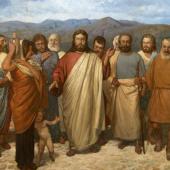A Song of Labour, Shaped in wood and Nail

May 01, 2025 Thursday of the Second Week of Easter
Feast of St. Joseph, The Worker
Daily Readings: Genesis 1:26-2:3; Matthew 13:54-58
The Church honors St. Joseph the Worker, celebrating the dignity of labor and the strength of those who work with integrity and humility. Instituted by Pope Pius XII in 1955, this feast affirms the value of work and offers a faith-based response to the celebration of labor on May Day.
St. Joseph, the humble carpenter of Nazareth, was entrusted with the task of protecting the Holy Family. He worked silently, faithfully, and selflessly, thus participating in God’s creative activity. He was able to integrate faith into daily work. His labor became an act of service and love, aligning with the words of St. Paul: “Whatever your work is, put your heart into it as if it were for the Lord” (Colossians 3:23).
The first reading from the Book of Genesis affirms that physical labor is a sacred vocation. St. Joseph stands as a perfect model who transforms ordinary tasks into acts of worship, co-creating with God. It is fitting to remember the words of St. John Paul II in Laborem Exercens: “Work is not a curse but a means of participating in the divine plan of salvation.”
As we reflect on St. Joseph the Worker, let us also remember all workers who build and sustain the world with their hard work and dedication. Their labor is the foundation upon which human communities thrive and progress is made. May this day renew our collective resolve to uphold workers’ rights and promote solidarity. As Pope Francis notes, “St. Joseph’s creative courage in adversity inspires us to see work as a path to holiness.”
Call to Action for Catholic Living:
- Advocate for fair and just wages, safe working conditions, and the dignity of all workers.
- Honor not only those in high positions but also those who labor in silence — farmers, factory workers, sanitation workers, children, and women employed in household tasks.
Radio Veritas Asia (RVA), a media platform of the Catholic Church, aims to share Christ. RVA started in 1969 as a continental Catholic radio station to serve Asian countries in their respective local language, thus earning the tag “the Voice of Asian Christianity.” Responding to the emerging context, RVA embraced media platforms to connect with the global Asian audience via its 21 language websites and various social media platforms.














